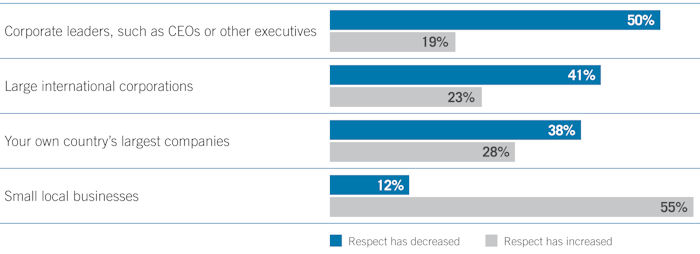Recent research highlights the effect of the CEO on the performance of the firm. In February, we discussed how a company’s reputation influences consumer purchasing. The same report contains salutary information for those who advise corporate leaders, as they show to what extent consumers have lost respect for company chiefs.Weber Shandwick’s chief reputation strategist Leslie Gaines-Ross quantifies the damage: “One out of every two consumers lost respect for corporate leaders over the past few years. Only 19 per cent increased their admiration. Overall, corporate reputations also took a hit – approximately four in ten consumers hold large international corporations and their own country’s largest companies in lower esteem than in years past.” However, Gaines-Ross says it is not all bad news, especially for small businesses: “On a more positive note, 55 per cent of consumers have gained respect for small local businesses.”
How has consumer respect for each of the following changed over the past few years?

Source: The Company Behind the Brand: In Reputation We Trust Report by Weber Shandwick
The importance of the CEO’s image is vital for a company’s prosperity, as if consumers don’t respect a business leader, they are less likely to buy the company’s products. These days, consumers are also more likely to form strong opinions about a company’s chief. Gaines-Ross explains: “Whether it is general internet access or an increased focus on jobs, business permeates the lives in consumers in ways never before imagined. Consumers may like or dislike CEOs, but there is no doubt that they are more attuned to what leaders are saying and doing than evidenced in years past.”
Looking at the four markets analysed by the report, CEO reputation has taken an especially large hit in developed markets, with nearly three-quarters of US and UK consumers having lost respect for corporate leaders in recent years. Company leader communications are obviously important across the world, but they are particularly valued in emerging markets. Gaines-Ross explains, “nearly two-thirds of Chinese consumers and nearly three-quarters of Brazilian consumers rely on executive communications when learning more about a company.”
These findings highlight the importance of a CEO on a company reputation. Gaines-Ross concludes: “Corporate reputation is not isolated from the public’s views of a company’s top leadership. Together, company and CEO reputation make a solid contribution to a firm’s market value. Companies should therefore not only invest in corporate reputation for the long-term, but also in the reputation of top executives to maximise the chances of weathering the current climate of anti-business sentiment and providing maximum completive advantage.”
Methodology
Weber Shandwick and its research arm, KRC Research, conducted an online survey among both consumers and executives. The research was conducted in October and November 2011 among 1,375 consumers aged over 18, and 575 senior executives in companies with revue of $500 million or more. Respondents were located in four key markets, the US, UK, China and Brazil. The research was used in Weber Shandwick's The Company Behind the Brand: In Reputation We Trust report.
PRmoment Leaders
PRmoment Leaders is our new subscription-based learning programme and community, built by PRmoment specifically for the next generation of PR and communications leaders to learn, network, and lead.
PRmoment LeadersIf you enjoyed this article, sign up for free to our twice weekly editorial alert.
We have six email alerts in total - covering ESG, internal comms, PR jobs and events. Enter your email address below to find out more:








